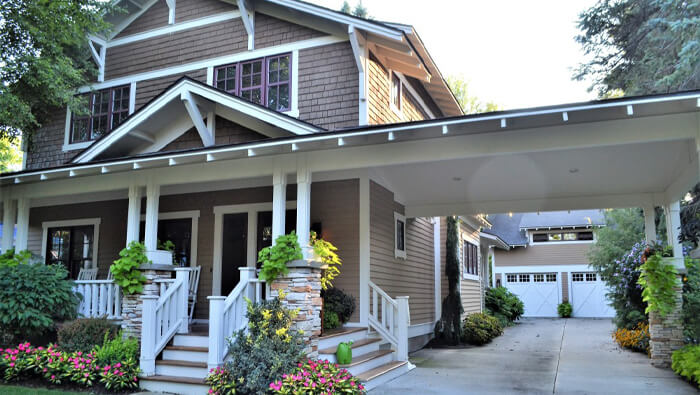When buying a house or a piece of property, a person often wonders, “Is now the right time to buy a house? Will I get a better purchase price if I wait? Could mortgage interest rates fall, saving me upwards of thousands of dollars? What if the market crashes? What does that mean?” There are so many thoughts of pros and cons that go into the initial “Should we buy a house?” that it could overwhelm some folks and make their dream of homeownership come to an abrupt halt.
But we have good news. You can overcome those thoughts and be well on your way to owning a home when you’re better informed. Let’s take a look at some vital information to help answer your question: Is now a good time to buy a home?
Key takeaways
- Good reasons to buy a house: low mortgage rates, rising property values, advantages of buying in late summer or early fall.
- Considerations before buying: low inventory of houses for sale, high prices asked by sellers, current instability of the economy, job market, and housing market.
- Buying a home is a major decision, and many factors come into play when determining the right time to do it.
Why is now a good time to buy a house?
The best time to buy a house is usually in late summer or early fall. That’s because there is less competition but still a good variety of property to choose from. You can never go wrong with the value of real estate, but the market plays a significant role in decisions, money available, and personal finances. When it comes to the winter months, buyers usually have more advantages because fewer people are looking for new homes.
So, even though there may be fewer houses on the market, there are also fewer competitors and buyers looking to purchase. That makes now one of the reasons that it’s a great time to buy a home.
Property values continue to rise
According to BusinessWire, the median home price rose to $258,206. In the last three months, it was calculated to be over 6.8%. So even though COVID-19 affected us in 2020, it hasn’t brought the value of houses down as some experts thought it might. It will be interesting to see the coming months and the projected rise of homes across the United States.
Mortgage rates are at an all-time low
According to FreddieMac, the mortgage rate has hit a record low for the past four months due to how slow our economic recovery has been. COVID-19 hit the country and affected the market greatly. The purchase demand is up 25% from this same time last year, with some speculating that this demand is due to people moving to more rural areas. However, due to the lack of homes on the market, it is uncertain how long these rates will stay at the record low. Right now, mortgage rates are at an average of 2.9% for a fixed 30-year loan, whereas it was 4.6% two years ago.
Why is now not a good time to buy a house?
The supply of homes—what’s available out on the market right now—is not as substantial as it used to be. Just a few short years ago, the market was flooded with homes to buy, and major competition and bids were going left and right. Now, however, that supply is decreasing, and the market of houses is shrinking, but prices are either staying the same or increasing. Homeowner sellers are at an advantage right now. Add in potential buyers’ fears of the future, and you’ll understand why some would-be buyers are holding off on buying a home right now.
Unknown economy due to recession
Unemployment, job cuts, lay-offs, and the potential of a new president are all factors that are making for an unknown economy. There is the possibility of job freezes, panic buying, and future shutdowns, making the foreseeable future an uneasy unknown for many people.
A low employment rate means low sales activity
A huge effect of COVID-19 and 2020 is the employment rate. Many workers were laid off or fired during the shutdown in March. Companies have continued to let employees go as the business has slowed down since reopening. While some workers have found new jobs, others have not, and that doesn’t look good for the economic recovery effects.
Another major aspect of low employment is the fact that lenders are stricter when it comes to borrowing. Their requirements have changed and tightened, making it harder for some people to secure the loan they need for a home purchase. These requirements include higher credit scores and lower LTV (loan-to-value) requirements.
Low housing inventory, high prices
Because of the low inventory on the market, sellers are able to ask for higher than normal home prices, regardless of the actual value for that property. This is one of the aspects we talked about above. If the loan to home value is too high, a lender’s chances of approving the mortgage are low.
This inflation of prices is expected to continue until the economy is more stable.
Rural living is on the rise
Due to COVID-19, many city-dwellers have chosen to leave the crowds and move to more rural areas. This is creating a bit of a domino effect. People are moving out of the city, leaving these properties empty and less maintained. This is also creating more buyers in certain areas that wouldn’t normally see an influx.
Home values are unstable
The economy is unstable, the job market is unstable, and the housing market is unstable. We could be entering into a major recession, which could cause property value to drop—nobody knows until we see what COVID-19 does next. According to HomeLight, a recession is defined as a “significant decline in general economic activity in a designated region”.
This is taken into account when unemployment rises, employment rates drop, and factors in income, sales, production, and values decrease as well. Even now, worries continue to rise on how large an impact COVID-19 will have on the future economy and housing market.
Has the COVID pandemic affected the housing market?
When the pandemic began in March, many homes were immediately delisted. At the same time, potential buyers stopped visiting homes that remained on the market. Around mid-April, sellers relisted their homes and buyers resumed their home buying search. By June, the home buying demand surpassed pre-pandemic levels.
Is now a good time to buy a property?
We don’t know the effects that COVID-19 will have on the housing market in the future. We know that today, mortgage rates are low and the market has many sellers but just as many buyers bidding on the available homes.
The question of is now a good time to buy a house is a personal one. If you have a steady income, a good credit score, the finances in place for a down payment, and a lot of patience to navigate the saturated market, then it may be a good time for you to purchase a home before rates increase. To help dispel the fear of an uncertain future and economy, build a small nest egg that could take you through a few months of living costs. This will give you a bit of security should the economy decline.
Contact us today!
Once you have made the decision to pursue the path of homeownership, contact the Hero Home Programs™. Their dedicated team will help you find grants, rebates, and loans across the United States. They can even help you improve your credit so you can be eligible for the best mortgage rate available. They work tirelessly to help you achieve the dream of homeownership and stand by you step-by-step through the home buying process. Request your consultation today.














